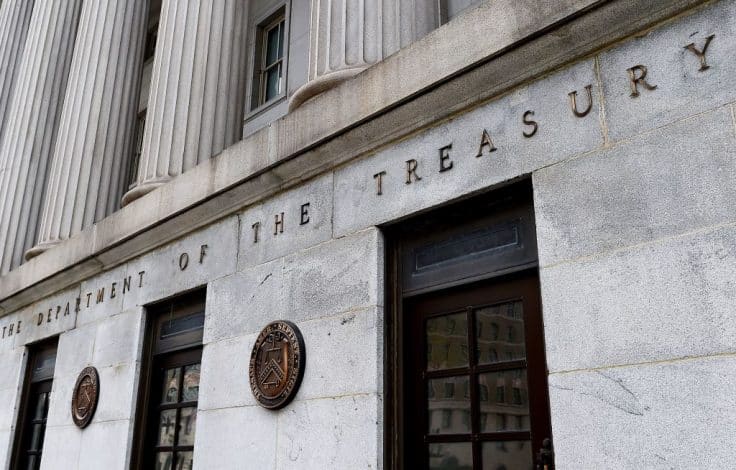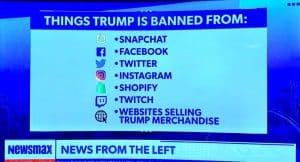The Trump administration on Monday issued a fresh round of sanctions on a Russia-backed network of individuals who attempted to influence the 2020 election by spreading false information about Joe Biden, according to an announcement by the Treasury Department.
The sanctions target several people linked to Andrii Derkach, the Ukrainian lawmaker who helped Trump lawyer Rudy Giuliani disseminate negative stories about President-elect Joe Biden and his son, Hunter, during the 2020 election cycle. Derkach, a leading pro-Moscow voice, was sanctioned in September, and the new measures are part of an effort by the U.S. government to crack down on his associates, who are tied to election interference as well. The sanctions target seven Ukrainians believed to be part of the Derkach-led network that sought to sway last year’s election through a series of online influence operations.
The United States maintains Derkach and his allies disseminated and promoted “fraudulent and unsubstantiated allegations involving a U.S. political candidate,” now widely known to be Biden. Derkach knowingly pushed false information about Biden’s dealings in Ukraine, the Treasury Department claimed in a statement that was notable for its rebuke of Russian sympathizers known to have worked with Giuliani, a top Trump adviser. Derkach, the government said, was acting “as an agent of the Russian intelligence services to influence the 2020 U.S. Presidential election.” The campaign was meant to “advance disinformation narratives that U.S. government officials have engaged in corrupt dealings in Ukraine.”
The statement was vague on details, however, about what information the United States specifically deemed to be false. Hunter Biden is currently under federal investigation for his work with Ukrainian energy company Burisma, giving credence to claims that he inappropriately profited from his family name.
The sanctions appear to pit the outgoing Trump administration against Giuliani and others who raised questions about Hunter Biden’s work in Ukraine. Giuliani met with Derkach in Ukraine’s capital in late 2019 and subsequently promoted dossiers containing allegations that Joe and Hunter Biden used their political access to profit from deals in the country. In the wake of last week’s deadly riot at the U.S. Capitol building, the sanctions could be seen as an effort by the American government to crack down on foreign disinformation campaigns that have helped sow political divisions in the United States.
“Much like the blatant falsehoods that helped foment the Capitol riots last week, Giuliani’s activities in Ukraine demonstrate the appalling lengths to which he and Trump are willing to go to further the president’s political fortunes—even if that means promoting conspiracy theories or getting into bed with individuals working on behalf of a hostile foreign power to undermine American interests both at home and abroad,” said John Hardie, a Russia expert who serves as research manager at the Foundation for Defense of Democracies.
Secretary of State Mike Pompeo also issued a statement vaguely accusing Derkach and his allies of promoting false narratives about “a U.S. political candidate.”
“They have made repeated public statements advancing malicious narratives that U.S. Government officials have engaged in corrupt dealings in Ukraine,” Pompeo said.
Four current and former Ukrainian lawmakers identified as acting as part of Derkach’s “inner circle” were hit with new sanctions, according to the Treasury Department’s announcement. They include Ukrainian Parliament member Oleksandr Dubinsky, who still maintains a YouTube channel seen as central to the disinformation campaign.
Derkach and his affiliates used social media sites such as Facebook, YouTube, and Twitter, as well as American media outlets, to promote Russian disinformation, according to the U.S. government.
The United States also sanctioned Petro Zhuravel, a “key member” of Derkach’s media team. Zhuravel runs NabuLeaks, “a cornerstone of Derkach’s election influence platform.” He also owns Only News and Skeptik TOV, both of which the United States identified as promoting materials meant to influence the 2020 election.
Hardie said Russia continues to use these networks to spread propaganda. YouTube and Google will likely have to shut down these networks in order to comply with American sanctions on Derkach and his allies.
“In addition to holding these individuals accountable, today’s sanctions should also help Washington restrict their ability to spread their disinformation through U.S. social media platforms such as YouTube, where Dubinsky had an account as of this afternoon,” Hardie said. “If properly enforced, the sanctions will also help Washington prevent the designated individuals from using the international financial system to facilitate corruption, such as alleged money laundering by Dubinsky and his wife through companies and bank accounts in Slovakia.”
In announcing the sanctions, the Treasury Department took the unusual step of telling the American public to fact-check information seen on social media, “particularly when the source or suspected source of the information is from outside the United States.”



